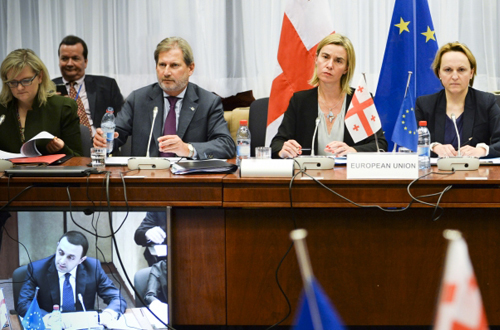
EU, Georgia Hold Second Meeting of Association Council

EU officials, among them (second from left) Commissioner for European Neighbourhood Johannes Hahn and (second from right) EU foreign policy chief Federica Mogherini seen as Georgia’s PM Irakli Garibashvili addresses second meeting of the EU-Georgia Association Council in Brussels on November 16, 2015. Photo: EU
EU-Georgia Association Council held its second meeting in Brussels on November 16 to look at the progress” made in the implementation of the Association Agreement and also at the remaining challenges, EU foreign policy chief, Federica Mogherini, said.
She co-chaired the meeting from the EU along with the Commissioner for European Neighbourhood and Enlargement Negotiations Johannes Hahn; the Georgian delegation was led by PM Irakli Garibashvili.
The council is a joint body at a ministerial level gathering at least once a year to address issues related to the implementation of the Association Agreement, signed between the EU and Georgia in June, 2014.
“It is clear from today’s meeting that we are committed to continue Georgia’s political association and economic integration with the EU,” said Mogherini, who visited Georgia last week.
“The need to guarantee the political environment that is calm and respectful is particularly important… Steps or statements, that would go against this, needs to be avoided,” she said after the meeting and also noted importance of “freedom of media, pluralism, respect for the rule of law, judicial independence to ensure democratic, inclusive and participatory elections” next year.
A joint EU-Georgia press release issued after the meeting says that “the EU particularly emphasised the importance of ensuring that criminal investigations and prosecutions are independent, evidence-based, transparent, impartial, and adhering strictly to principles of due process, in line with the commitments undertaken in the Association Agreement.”
“I think we can look back with satisfaction at the great deal of progress we both – the EU and Georgia – have achieved,” Commissioner Hahn said after the meeting.
“We recognize Georgia’s reform efforts and its European aspiration. We congratulate Georgia on the good efforts already made for approximation of the Georgian national law to the European Union standards,” he added.
Standing alongside with Mogherini and Commissioner Hahn after the meeting, Garibashvili said: “Georgia has registered important achievements in areas such as consolidation of democracy, strengthening of independence of judiciary and rule of law, fighting against corruption, protection of human rights… Yet we are determined to deliver more on bringing Georgia in line with the European standards.”
Mogherini said that the EU welcomes progress made by Georgia towards visa liberalisation “with many benchmarks already being fulfilled.”
“The efforts to fulfill the remaining ones will need obviously to continue,” the EU foreign policy chief said.
Visa liberalisation action plan, a set of detailed reform targets, lists benchmarks which a country has to fulfill to become eligible to short-term visa free travel with the Schengen area. The previous assessment of Georgia’s implementation of the action plan was made by the European Commission in May, 2015 and the new one is expected by mid-December. Georgian officials hope that in this new one the European Commission finds all the benchmarks achieved and recommends to the member states to give the country visa free travel regime.
“I cannot anticipate the decision that will be taken, but I see a very positive signs of the process in the front of us,” Mogherini said.
Georgian PM Garibashvili said that his government “has spared no efforts and resources to fulfill all benchmarks” of the visa liberalisation action plan.
“We truly hope that our accomplishments will be duly evaluated and consequently will lead to positive decision on the EU’s part to introduce visa free travel for Georgia’s citizens,” PM Garibashvili said. “We think that such a decision will demonstrate to the people of Georgia that the European choice delivers concrete results.”
The joint EU-Georgia press release after the Council meeting says that “the EU noted with satisfaction the progress being made in implementing” benchmarks remaining since the previous assessment by the European Commission in May, 2015.
The EU has reiterated its support to Georgia’s territorial integrity. The Georgian PM said that despite Tbilisi’s “pragmatic and rational” policy towards Russia, “a little progress has been achieved in political discussions” with Moscow.
According to the EU its assistance to Georgia has increased “significantly” for the period of 2014-2017, with an annual average of EUR 100 million available to support “the ambitious political, judicial and economic reforms envisaged in the Association Agreement.”
The Georgian delegation also included Foreign Minister; Minister of Economy; Justice Minister; State Minister for Reconciliation and Civic Equality, and State Minister on European and Euro-Atlantic Integration.
Earlier on November 16 Georgia’s Foreign Minister Giorgi Kvirikashvili met in Brussels some of his counterparts from EU-member states at “Friends of Georgia” meeting, hosted by the Lithuanian and Swedish foreign ministers.
Morning started with Friends of #Georgia meeting. We support Georgia’s integration w/ EU & Visa-Free travel to EU pic.twitter.com/L7ymBgVjDK
— Marina Kaljurand (@MarinaKaljurand) November 16, 2015
Also on November 16 Kvirikashvili along with Justice Minister Tea Tsulukiani met European Parliament members from the Committee on Foreign Affairs.
The meeting, which initially was supposed to be public, was held behind the closed doors. In his opening remarks, chair of the committee MEP Elmar Brok said that he had a meeting with the Georgian Foreign Minister and discussed issues related to imprisonment of former government officials, specifically of ex-mayor of Tbilisi Gigi Ugulava, as well as freedom of media and rule of law in Georgia.
This post is also available in: ქართული Русский